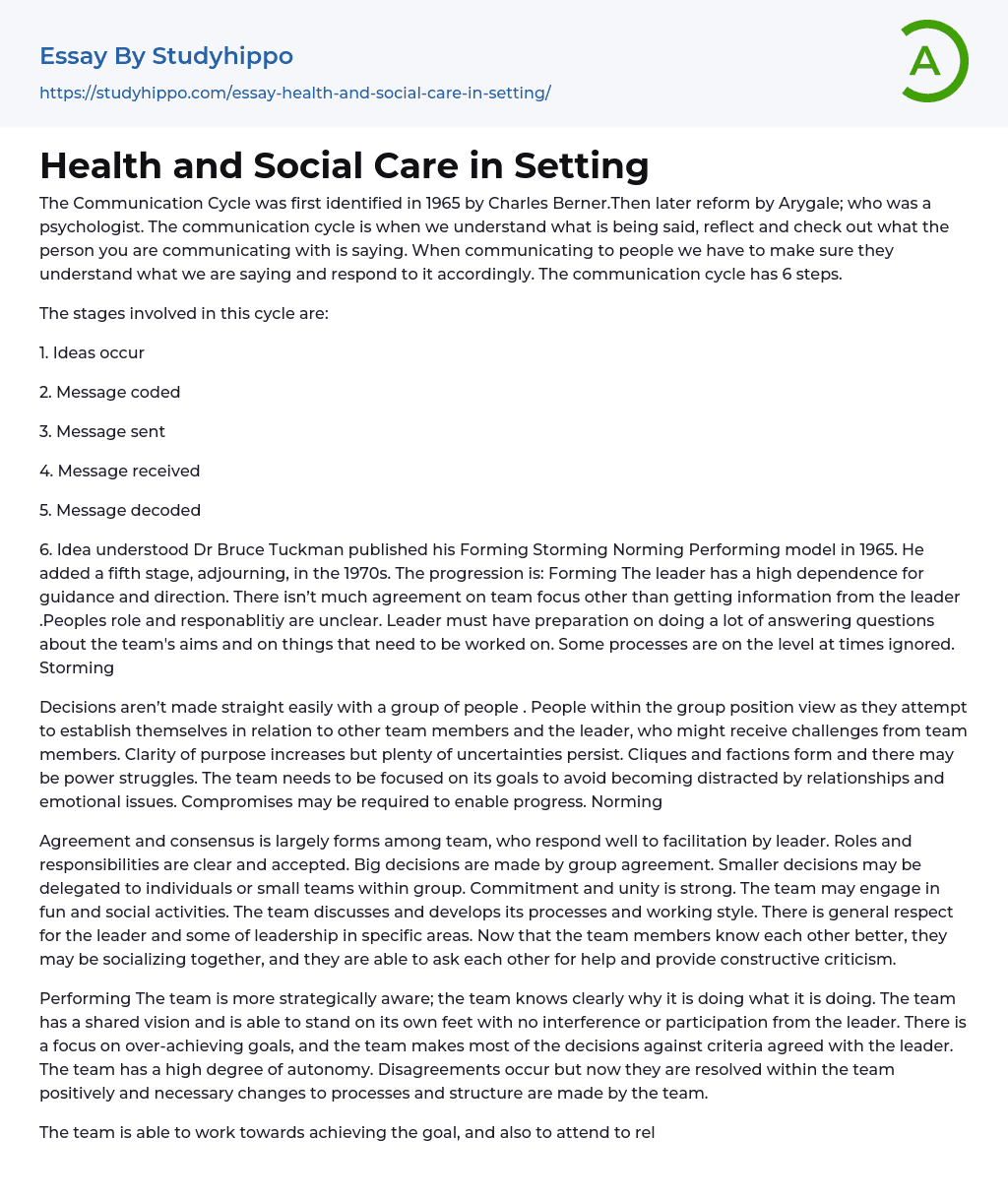The Communication Cycle was first identified in 1965 by Charles Berner.Then later reform by Arygale; who was a psychologist. The communication cycle is when we understand what is being said, reflect and check out what the person you are communicating with is saying. When communicating to people we have to make sure they understand what we are saying and respond to it accordingly. The communication cycle has 6 steps.
The stages involved in this cycle are:
1. Ideas occur
2. Message coded
3. Message sent
4. Message received
5. Message decoded
6. Idea understood Dr Bruce Tuckman published his Forming Storming Norming Performing model in 1965. He added a fifth stage, adjourning, in th
...e 1970s. The progression is: Forming The leader has a high dependence for guidance and direction. There isn’t much agreement on team focus other than getting information from the leader .Peoples role and responablitiy are unclear. Leader must have preparation on doing a lot of answering questions about the team's aims and on things that need to be worked on. Some processes are on the level at times ignored. Storming
Decisions aren’t made straight easily with a group of people . People within the group position view as they attempt to establish themselves in relation to other team members and the leader, who might receive challenges from team members. Clarity of purpose increases but plenty of uncertainties persist. Cliques and factions form and there may be power struggles. The team needs to be focused on its goals to avoid becoming distracted by relationships and emotional issues. Compromises may be required to enabl
progress. Norming
Agreement and consensus is largely forms among team, who respond well to facilitation by leader. Roles and responsibilities are clear and accepted. Big decisions are made by group agreement. Smaller decisions may be delegated to individuals or small teams within group. Commitment and unity is strong. The team may engage in fun and social activities. The team discusses and develops its processes and working style. There is general respect for the leader and some of leadership in specific areas. Now that the team members know each other better, they may be socializing together, and they are able to ask each other for help and provide constructive criticism.
Performing The team is more strategically aware; the team knows clearly why it is doing what it is doing. The team has a shared vision and is able to stand on its own feet with no interference or participation from the leader. There is a focus on over-achieving goals, and the team makes most of the decisions against criteria agreed with the leader. The team has a high degree of autonomy. Disagreements occur but now they are resolved within the team positively and necessary changes to processes and structure are made by the team.
The team is able to work towards achieving the goal, and also to attend to relationship, style and process issues along the way. team members look after each other. The team requires delegated tasks and projects from the leader. The team does not need to be instructed or assisted. Team members might ask for assistance from the leader with personal and interpersonal development. Leader delegates and oversees Adjourning
justify">The fifth stage is, Adjourning, is the break-up of the group, hopefully when the task is completed successfully, its purpose fulfilled; everyone can move on to new things, feeling good about what's been achieved. From an organizational perspective, recognition of and sensitivity to people's vulnerabilities in Tuckman's fifth stage is helpful, particularly if members of the group have been closely bonded and feel a sense of insecurity or threat from this change.
Social Workers often have to communicate in situations where conditions may present many barriers to communication. They may also be working with individuals who are reluctant to communicate and resistant to change. Consequently specialists are required to have advanced communication skills if they are to be effective.
- Anatomy and Physiology essays
- Addiction essays
- Biodegradation essays
- Dental Care essays
- Disease essays
- Disorders essays
- Health Care essays
- Intelligence Quotient essays
- Nutrition essays
- Olfaction essays
- Public Health essays
- Women's Health essays
- World health organization essays
- Cancer essays
- Infectious Disease essays
- Lung Cancer essays
- Neurology essays
- Physical Exercise essays
- Medicine essays
- Sex essays
- Inquiry essays
- Disability essays
- Poison essays
- Action Potential essays
- Nervous System essays
- Childbirth essays
- Puberty essays
- Blood essays
- Kidney essays
- Neuron essays
- Body essays
- Glucose essays
- Sense essays
- Heart essays
- Skeleton essays
- Human Physiology essays
- Eye essays
- Immune System essays
- Muscle essays
- Skin essays
- Brain essays
- Central Nervous System essays
- Human Skin Color essays
- Digestive System essays
- Common sense essays
- Respiration essays
- alcoholism essays
- Smoking essays
- Casino essays
- Tobacco essays


Unfortunately copying the content is not possible
Tell us your email address and we’ll send this sample there.
By continuing, you agree to our Terms and Conditions.


